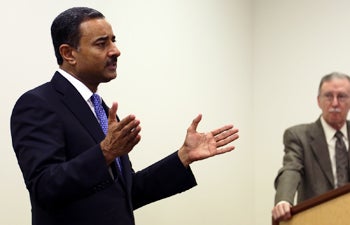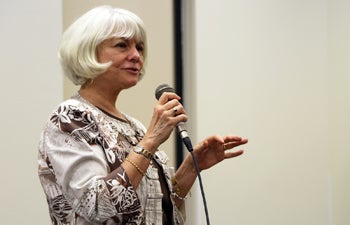Royal Subject to Citizen
U.S. Ambassador to Saudi Arabia James B. Smith witnessed firsthand the changes that took place in his region as the Arab Spring movement gained traction in 2010 and spread throughout the Arab world.
These two words emerged as central themes: participation and control.
“The social contract in the region has always been one where the government provides and the population is thankful, and therefore quiet,” Smith told USC students at the Davidson Continuing Education Conference Center on Sept. 16. “Here, we saw a different dynamic at work.”
Living in Saudi Arabia, Smith saw change underway beginning in 2009. That November, torrential rains had caused devastating floods in Jeddah, Saudi Arabia, killing more than 100 people. Major roads were damaged and nearly 22,000 people were displaced.
In the aftermath, Saudis were outraged by their government’s inadequate preparation and poor rescue efforts. It was a pivotal moment for the monarchy, Smith said.
People took it upon themselves to help their neighbors rather than relying on the government. Led by women and youths, community groups collected blankets and distributed food to those in need.
“People were seeing themselves as citizens and not subjects,” Smith said. This was the evolution of civil society at the local level — participation, he said.
A shift has also taken place in the region in terms of control, Smith continued, specifically when it comes to information. Before smartphones and social media, people had received their information from their parents, a tribal chief or their teachers. “That was all the access of information you had,” Smith said.
But now, information is ubiquitous. “Every teenager you meet has a Blackberry or an iPhone,” he said. “Today they can pull information globally and government can no longer control that.”
For governments used to controlling their populations and the messages they heard, how they react to this transition of control will ultimately determine their success in the wake of the Arab Spring, Smith said.
“Whole populations no longer see themselves as subjects, they see themselves as citizens. They are demanding that their governments are responsive to their needs,” he said.
“Those governments that are responsive — and Saudi Arabia and its monarchy have largely been responsive — they’re going to do OK. Those governments that default to the old methods of trying to control the population, that’s where you’re going to have chaos.”
Smith’s talk, “International Security and Business in the Middle East Today” was organized by the USC Dornsife School of International Relations.

Amer Kayani, minister counselor for commercial affairs for the U.S. Embassy in Saudi Arabia, provides students with an overview of the current state of business and the economy in the Middle East. Photo by Matt Meindl.
Moderator John Odell, professor emeritus of international relations, said the event provided students with a firsthand perspective of a region that is currently undergoing significant changes.
“It was a terrific opportunity to hear U.S. diplomats give their thoughtful analyses on topics such as the large youth demographic of the Arab world and their demand for jobs, opportunities for foreign business and the rebellions of the past two years, as well as Saudi women’s attitudes about their gender-segregated culture,” Odell said.
The discussion also featured two USC Dornsife international relations alumni. Amer Kayani is minister counselor for commercial affairs for the U.S. Embassy in Saudi Arabia and Janet Breslin-Smith is former professor at the National War College.
Kayani spoke on the economy in the Middle East.
While many of the economies in the region are controlled by the state, Kayani believes the region will eventually revert to free market principles with technology acting as an equalizer across socio-economic groups.
“These changes will not be in the form of a revolution, but rather gradual,” he said.
For instance, leadership in countries where state-owned enterprises have failed to create jobs are realizing they must allow smaller enterprises to flourish in order to generate employment for youth 24 and under, who make up more than 50 percent of the Middle East’s population.
Entrepreneurs will play a crucial role in shaping the region’s business landscape, Kayani said, noting, for example, that a group of young entrepreneurs created a useful application to navigate Cairo’s notorious traffic.
“Behind the headlines of turmoil and unrest we often miss the profound changes that are taking place,” Kayani said. “They are mostly driven by a new generation of entrepreneurs who use technology to innovate and solve social problems, and navigate the Arab world’s unique obstacles and opportunities.”

Janet Breslin-Smith, former professor at the National War College, offers students a perspective on women in the Arab world. Photo by Matt Meindl.
Breslin-Smith, Ambassador Smith’s wife, gave her perspective on women in the Arab world.
Living in Saudi Arabia for the past four years, she has learned about life from a woman’s point of view. “Because it is a gender-segregated society I was meeting a number of women my husband would never meet,” Breslin-Smith said.
Despite the conflict in the region, she said Saudi women express a deep love and compassion for Islam and for their culture.
Laurie Brand, Robert Grandford Wright Professor and professor of international relations, attended the event with students in her course, “Middle East Political Economy.” One of her students, sophomore Middle East studies major Timothy Vernon, said he gained a broader understanding of recent events as a result of the ambassador’s visit.
“It’s a very different perspective that you get than from just reading news articles,” he said. “It was a great learning opportunity.”
Smith commended the students for studying politics and economics in the Middle East.
“The Middle East for all its challenges will be for your generation the place where ideas of the day are debated long past the Arab Spring, Syria and all of the challenges around Saudi Arabia,” he told the crowd.